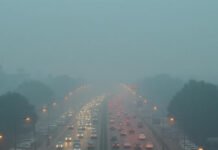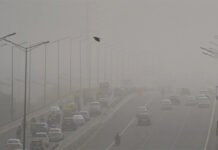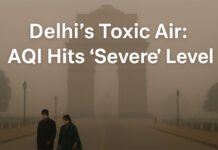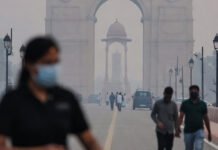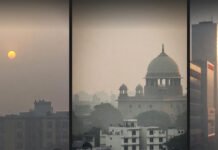New Delhi, November 10:
As toxic smog once again blankets India’s capital, Delhi’s air pollution crisis has ignited a wave of public protests across the city, leading to several activist detentions and renewed calls for government accountability.
With the Air Quality Index (AQI) hovering well above 450 — classified as ‘Severe’, residents say the annual health emergency has reached intolerable levels, threatening millions, particularly children, senior citizens, and those with respiratory conditions.
Protests Across the Capital
Environmental groups, students, and health advocates staged demonstrations at India Gate and Jantar Mantar, demanding urgent policy reforms, stricter industrial emission controls, and a comprehensive urban air strategy.
Police intervened as crowds grew, detaining several protesters under preventive orders. Many carried placards reading “Let Delhi Breathe” and “Clean Air Is a Right, Not a Privilege.”
“We are not protesting politics — we are protesting for life,” said Ananya Gupta, a youth activist with the Green Delhi Network.
Health Emergency Intensifies
Doctors have warned of a surge in asthma, eye irritation, and cardiac distress, with hospitals reporting a spike in pollution-related admissions.
Experts say the current smog layer has been worsened by stubble burning, vehicular emissions, and stagnant winds, creating a toxic cloud that traps particulate matter across NCR.
Government Response
Officials claim measures like odd-even road rationing, construction bans, and anti-smog guns are being deployed, but activists argue these are temporary optics rather than long-term solutions.
The Delhi government has urged citizens to work from home and limit outdoor exposure, while schools have shifted to online classes in several districts.
Public Outcry and Legal Action
The National Green Tribunal (NGT) and Supreme Court have also taken note, summoning reports from multiple agencies. Public health groups are urging for a permanent Clean Air Mission, akin to India’s renewable energy push.
“If clean energy is national priority, clean air must be constitutional priority,” said environmental lawyer Raghav Bhatnagar.
Conclusion
Delhi’s pollution nightmare has become more than a seasonal headline — it’s a recurring humanitarian crisis. As residents choke on unbreathable air, the protests signal a growing public impatience for sustainable, accountable action.


